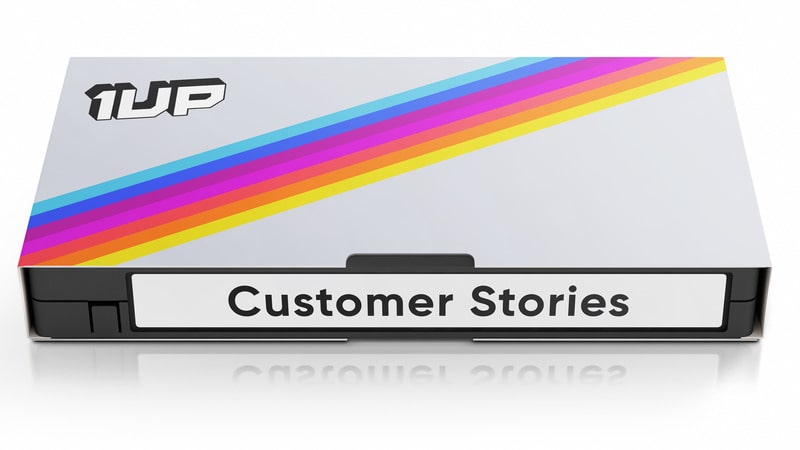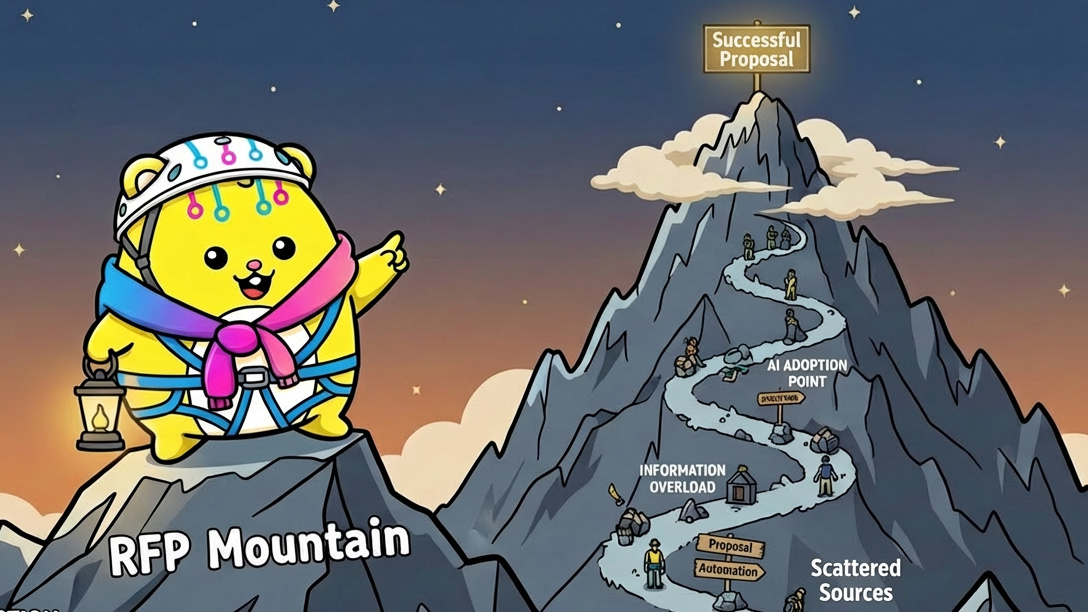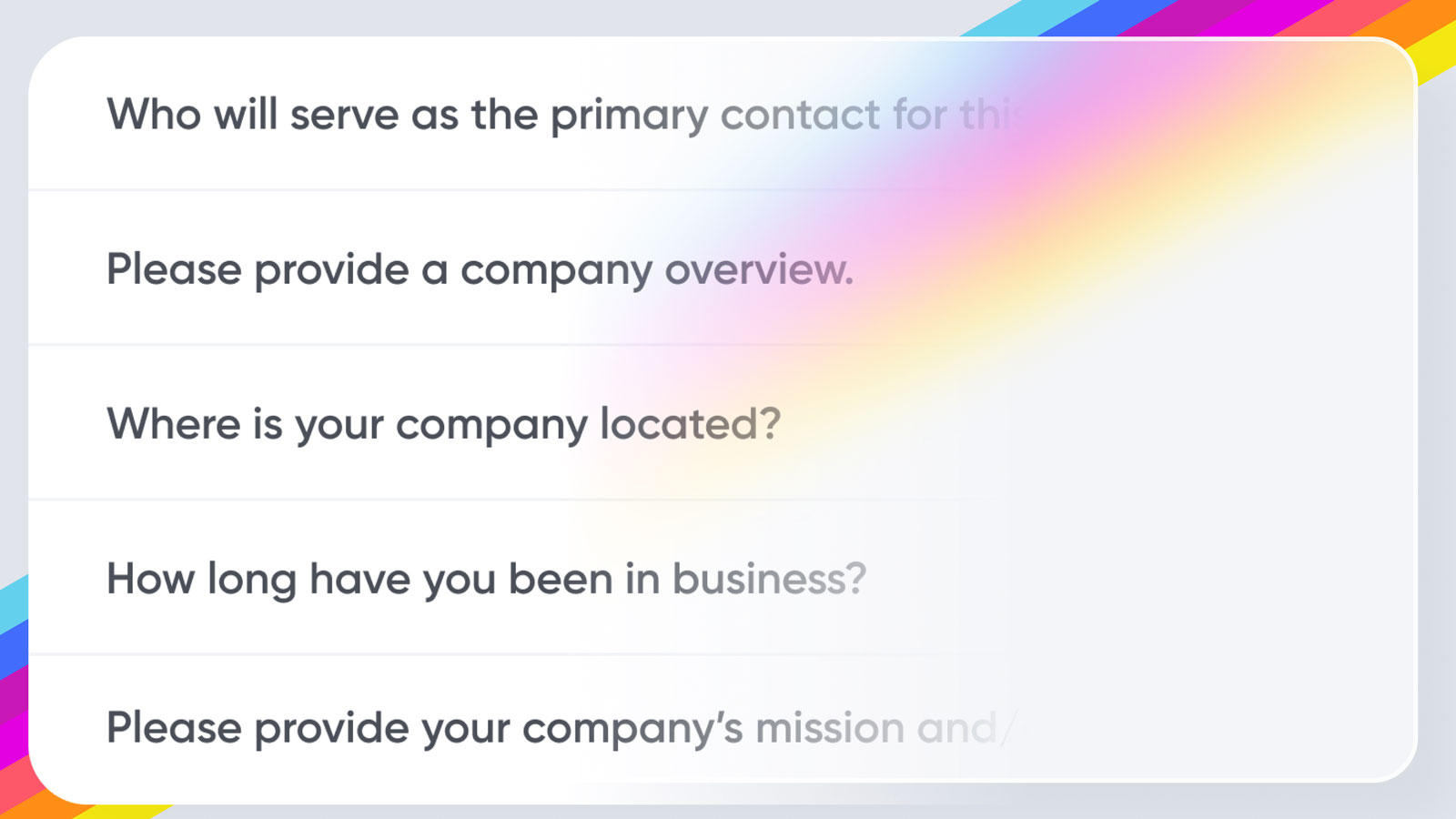If you’ve ever been part of a big purchase, you’ve probably heard the terms RFP, RFQ, and RFI thrown around. They sound similar, but they each do something different in helping companies decide what to buy and who to work with.
Picture a meeting. Someone says, “Let’s send an RFP.” Another person says, “We’re not ready, we need an RFI.” Then finance chimes in with, “What about an RFQ?” Everyone nods, and somehow, everyone’s still a little confused.
This guide will break down the RFX process, perfect for both beginners and those already automating the RFP process to make it smoother. You’ll learn what each term means, when to use it, and how they connect inside one smooth RFX cycle. We’ll walk through examples, comparisons, and a few insights from people who live and breathe proposals.

Simply put, here’s what you need to know about each kind of request:
- RFI (Request for Information): Used to gather general information about the market and potential vendors.
- RFQ (Request for Quotation): Used to obtain pricing and value propositions from vendors for specific goods or services.
- RFP (Request for Proposal): Used for a detailed evaluation of vendor capabilities and solutions for complex projects.
What is an RFX and Why It Matters
RFX is a catch-all term for formal requests in procurement and sales. The “X” changes depending on what stage you’re in: information, quotation, or proposal.
| Acronym | Full Form | Stage | Purpose |
| RFI | Request for Information | Early research | To learn what’s available |
| RFQ | Request for Quotation | Mid-stage | To compare prices |
| RFP | Request for Proposal | Final stage | To evaluate full solutions |
Understanding these stages keeps teams aligned. Skipping straight to an RFP before clarifying what’s needed often leads to extra work and confusion. Working through each phase helps you gather data, compare options, and make clear, confident decisions.
What is an RFI (Request for Information)?
Every smart purchase starts with learning. That’s what an RFI is for. It’s a structured way to explore what’s possible before talking about pricing or deliverables.
An RFI helps you understand what solutions exist, how they work, and who might be a good fit for your needs. It’s not about cost yet. It’s about clarity.
Questions in an RFI might include:
- What integrations or features do you support?
- How long does implementation take?
- Who typically uses your product or service?
- What kind of post-launch support do you offer?
What an RFI does not usually include:
- Detailed pricing or payment terms
- Contractual or legal commitments
- Specific implementation timelines
- Product demos or technical deep dives
- A request for creative proposals or full solutions
A good RFI is short, specific, and easy to answer. It gives your team a clear view of what’s available without overwhelming vendors or wasting time.
In short, an RFI helps teams map out the market early, identify qualified vendors, spot new technologies or trends, and avoid wasted effort later in the procurement process. Its purpose is to provide the insight needed to make the next step, the RFQ or RFP, faster, sharper, and more focused.
What is an RFQ (Request for Quotation)?
Once you know what you need, it’s time to get the numbers. That’s where an RFQ comes in.
An RFQ gathers pricing and delivery information from vendors so you can compare options directly. It’s practical, specific, and designed for side-by-side evaluation.
Example
A company ordering ten thousand branded boxes might outline dimensions, materials, and delivery dates. Each supplier submits a quote with costs and timelines. From there, the buyer can compare quickly and make a confident decision.
RFQs are common in industries that rely on precision such as logistics, manufacturing, IT, and construction. They keep things transparent and help buyers move smoothly from options to outcomes.
An effective RFQ includes:
- A list of products or services
- Quantity and quality details
- Timelines and delivery expectations
- Payment terms
What an RFQ does NOT usually include:
- Broad business goals or strategic objectives
- Open-ended questions about vendor capabilities
- Requests for innovative or custom solutions
- Detailed project plans or creative input
- Negotiations on contract terms or scope changes

A clear, well-written RFQ keeps everyone focused on facts instead of guesses, making it easier to move from information to action.
RFQs help teams compare prices across multiple vendors, evaluate delivery timelines, confirm that each quote meets the same requirements, and make confident, data-driven decisions. Its purpose is to bring clarity to the numbers so you can move from research to real choices with ease.
What is an RFP (Request for Proposal)?
An RFP, or Request for Proposal, is what a company sends out when it knows what it wants to do but needs a partner to help figure out how to get there. It’s not a price check. It’s an open call for solutions.
An RFP typically includes:
- Background on the company and project
- Goals and technical requirements
- Submission instructions
- Evaluation criteria
What an RFP does not usually include:
- General market research or open-ended discovery questions
- Highly technical pricing breakdowns better suited for an RFQ
- Informal vendor introductions or early-stage qualification steps
- Speculative or incomplete project details
- Requests without a clear decision or budget framework
Once the responses come in, the team compares them side by side. They look at cost, but also at how complete and realistic each proposal feels. Experience matters, too. So does timing and support.
| Category | What It Measures |
| Cost | Overall investment and ongoing expenses |
| Quality | How well the proposal fits the need |
| Experience | Vendor track record and references |
| Delivery | Timelines, resources, and support |
Example
A university looking for a digital learning platform issues an RFP describing its goals such as better analytics, accessibility, and scalability. Vendors respond with detailed plans showing how they’ll meet those goals.
More teams are now handling the RFP process with AI. They rely on automation to handle the busywork. If you’re wondering what automated RFP responses look like, here’s a 2 minute demo:
Platforms like 1up help proposal managers and sales engineers keep track of everything in one place. It stores reusable answers, assigns tasks, and keeps deadlines visible. That means fewer late nights and lost files.
An RFP helps teams:
- Compare complete solutions, not just costs
- Evaluate experience, credibility, and cultural fit
- Align vendor proposals with long-term business goals
- Select the partner most capable of delivering consistent value
Its job is to move you from comparing prices to choosing a true partner who understands your goals and knows how to deliver on them.
RFI vs RFQ vs RFP: How They Work Together
Most teams don’t start out planning to use all three. It usually just happens over time. You start broad, get specific, and then make your final call. That’s the basic rhythm of the RFX process.
An RFI comes first. It’s about learning. You send it when you’re still figuring out what’s possible and who might be worth talking to. Think of it as your research stage. It gives you a sense of the market and helps shape your next step.
Then comes the RFQ. Now you’re asking for prices. You already know what you need, so this is about collecting the numbers and timelines. It’s practical, it’s transactional, and it helps you compare options side by side.
Finally, there’s the RFP. This one digs deeper. You’re not just asking what something costs. You’re not just asking for a feature list. You’re asking how it will work, how it will be delivered, and whether the vendor actually understands your goals.
Here’s how they usually line up in practice:
| Feature | RFI | RFQ | RFP |
| Purpose | Learn what’s out there | Gather prices | Choose the best-fit partner |
| When to Use | Early discovery | Once details are defined | After shortlisting vendors |
| Focus | Capabilities | Cost | Strategy and value |
| Complexity | Low | Medium | High |
| Response Type | Short written info | Price sheet or quote | Full proposal |
Example
A company planning new software starts with an RFI to explore vendors. That step usually takes a few weeks and helps narrow the list to those that truly fit the need. Next comes an RFQ, where pricing and delivery details are compared across the top contenders. Finally, an RFP goes out to just a few finalists who are invited to propose full solutions.
In large enterprises, this full RFI–RFQ–RFP process can span several months and involve multiple review rounds. Smaller companies tend to move faster. Many skip the early stages and go straight to an RFP or even a single detailed quote to save time.

However it’s structured, the goal is the same: to move from exploration to decision with enough clarity to pick the right partner, not just the lowest price.
When teams stick to this flow, everything just moves faster and the decisions make more sense, like a chain reaction. One step leads to the next until everything starts making sense.
AI-powered RFX tools can also make a big difference. Supply Chain 360 says they help teams get through all those stages faster, with fewer mistakes, and a lot less stress.
A Few Real Examples of How Teams Use RFX
Let’s look at how different teams apply the RFX process.
Example A: SaaS Vendor Selection
A tech startup exploring CRM systems starts with an RFI to understand available tools. After narrowing down options, it issues an RFQ to compare pricing for 100 seats. Finally, it sends an RFP to evaluate implementation partners and integrations.
Example B: Event Management Services
A marketing department planning a 2,000-person conference starts with an RFI to find agencies that can handle hybrid events. Next, it sends an RFQ for catering and logistics costs, then an RFP to choose a full-service event partner.
Example C: IT Infrastructure Upgrade
An enterprise IT team that already knows its technical needs skips the RFI stage. It issues an RFQ for hardware and an RFP for managed services and ongoing support.
How Automation Has Changed the RFX Game
Every stage of the RFX process serves a purpose.
- The RFI helps you explore.
- The RFQ clarifies costs.
- The RFP brings it all together so you can move forward with confidence.
When you connect these steps, especially using automation, your process becomes proactive instead of reactive. You make decisions faster, collaborate better, and see results sooner. The best proposal and procurement teams are automating the RFX process. Here’s how they do it:
1. Keep everything in one place
RFX projects move faster when everyone’s working from the same playbook. That means storing templates, responses, and reference material in one shared workspace instead of scattered folders and endless email threads. A well-organized RFP response library becomes your team’s single source of truth. It’s the kind of quiet fix that saves hours without anyone noticing.
2. Let automation handle repetition
Most proposal teams lose time to the same routine tasks: copying old answers, fixing formatting, or chasing down missing details. Those steps don’t need a human touch anymore. Today’s automation tools can fill in standard responses, flag incomplete sections, and track progress automatically.
That doesn’t replace people. It removes the tedious parts so they can focus on writing smarter, more persuasive responses. The result is more consistent quality, faster turnarounds, and fewer last-minute scrambles.
3. Make collaboration simple
RFX work is rarely done by one person. Sales, product, legal, and finance all have a say. The hardest part isn’t getting SME input, it’s getting it on time. Shared timelines, tracked reviews, and simple commenting tools keep everyone aligned without the constant follow-ups. When feedback flows naturally, deadlines stop feeling like emergencies.
Here’s a demo of how teams collaborate on an RFP:
If you’ve ever managed an RFP the old-fashioned way, you know the drill. Too many spreadsheets, endless email chains, and the constant worry that someone’s working off the wrong version. It worked for a while, but not well.
Today, things are a little different. RFP tools have grown up. The right ones go beyond simply tracking responses. They help teams stay aligned, write faster, and actually learn from every project they finish. Picking the right kind of software depends on how your team works and what you need most.
1. Traditional RFP Management Systems
These are built for structure and control. They’re the backbone for big procurement teams or industries where compliance comes first. They track every approval and keep an audit trail for peace of mind. The downside is that they can feel heavy. They take time to set up and usually need someone to keep the system organized. But if you need strict documentation, these tools are still hard to beat.
Examples: Loopio, Ombud
2. Collaborative Proposal Software
This type was made for teamwork. It brings everyone, including sales, product, and procurement, into the same workspace so content, templates, and tasks stay in sync. You don’t lose hours sorting through versions or hunting for the right file. It’s a nice fit for mid-sized teams that want to be organized without slowing down. You’ll still do some manual work, but it’s a smoother ride overall.
Examples: Qvidian, Responsive
3. AI-Powered RFX Automation Platforms
This is where everything starts to click. Platforms like 1up and Tribble use AI to handle the repetitive stuff, things like filling in standard answers, matching responses to questions, and tracking progress. They don’t just manage data. They help people work smarter. When the routine work disappears, teams can focus on strategy and storytelling. For organizations that deal with a steady flow of RFIs, RFQs, and RFPs, that shift makes a huge difference.
Examples: 1up, Tribble
Each of these tools brings something useful. Traditional systems give you order. Collaborative tools make teamwork easier. AI-powered platforms add speed and consistency. The right choice depends on how your team works and how much time you’re willing to save.
The truth is, most teams today want something lighter and faster. That’s why AI tools are taking over. They don’t replace people. They let people do their best work without getting stuck in the admin part.
That’s where modern RFP tools really shine. They give teams structure without the struggle, speed without the stress, and smarter ways to work without losing the human touch.

Want a deeper dive?
Check out our RFP Software Buyer’s Guide.
How teams use 1up to automate the RFP process
From WalkMe (SAP) to Gladly and Varonis, businesses of all sizes use 1up to automate the painful process of responding to RFPs.
1up provides a powerful knowledge base to generate answers using accurate sources you trust. Instead of juggling files and feedback across different systems, everything lives in one shared workspace. You can create, send, and track every RFP in one place.
1up fills in the repetitive parts and highlights what needs attention. It makes collaboration easy. That means proposal teams spend less time managing logistics and more time crafting strong, thoughtful answers that actually win deals.
Teams that once took weeks to finalize proposals now do it in hours, in some cases, even minutes. The real impact goes beyond speed – check out how JumpCloud 2x’d their pipeline by automating questionnaires.

1up brings structure, speed, and accuracy to RFX work without the usual friction. You’ll spend less time chasing edits and more time focusing on what wins deals: clarity, quality, and connection.
Want to see it in action? Get a Demo.



 Instagram
Instagram 











